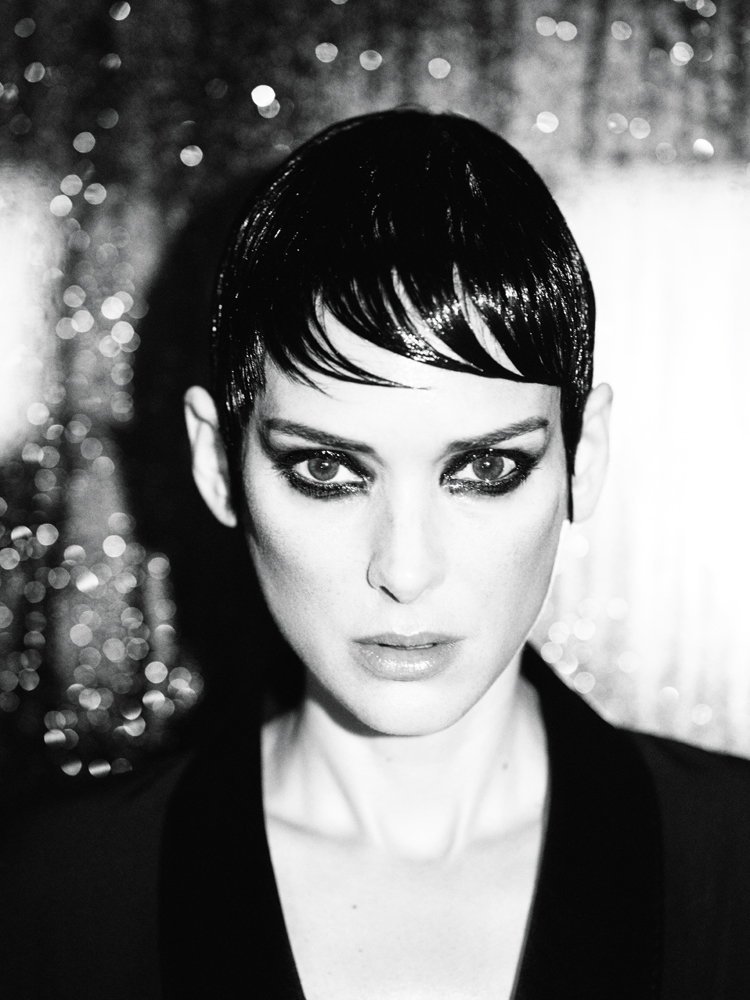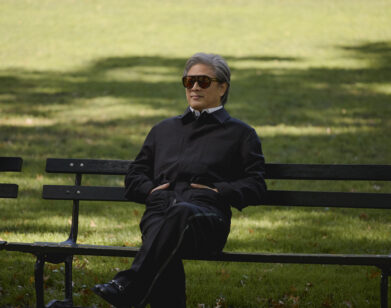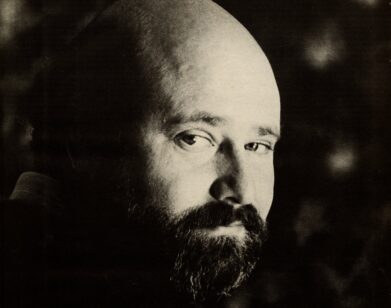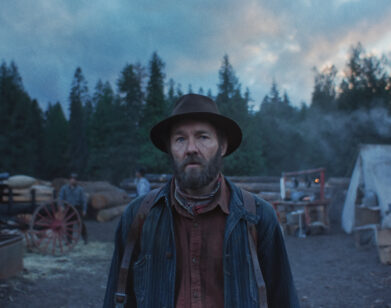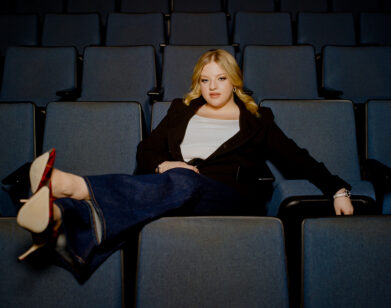The Beloved: Winona Ryder
It’s hard to talk about Winona Ryder without at least acknowledging the mythos that surrounded her as she came to define a certain authentic cool in the early ’90s. Doe-eyed and dark-haired, Ryder appeared, for young people who identified outside the mainstream, to be a kindred spirit. She entered pop consciousness in late ’80s as a cult-movie ingénue of sorts, first as the goth pixie Lydia Deetz in Tim Burton‘s absurdist Beetlejuice (1988), and then as Veronica, a too-smart recruit to the mean-girls clique, in the dark revenge comedy Heathers (1989). Soon after, she established her indie cred in Jim Jarmusch‘s Night on Earth (1991) and embodied the Gen X zeitgeist in Ben Stiller’s Reality Bites (1994), in effect, becoming an icon of quirky angst, and in the process, revealing herself to be one of the most precociously talented actresses of her generation.
Growing up in San Francisco and, for four years, in a commune in Northern California, Ryder fell in love with film watching the greats: Bette Davis, Gena Rowlands, Ruth Gordon, and Audrey Hepburn. And, now 44, she’s built her own body of work by making shrewd choices those actresses would approve of, including last year playing a tough city councilwoman in David Simon’s HBO miniseries Show Me a Hero. Ryder will next star in the Netflix supernatural-thriller series Stranger Things, as well as the spring beauty campaign for her longtime friend, the designer Marc Jacobs.
In February, Ryder met with her friend, fellow actress and Rookie editor-in-chief Tavi Gevinson to talk about film and favorite actresses. Gevinson, who will appear, beginning this month, in the Broadway production of The Crucible, where she plays Mary Warren, came prepared, and the two dived in.
WINONA RYDER: I remember realizing, when I did Little Women [1994], that that was the only time girls that age were being written about. It was always boys—from David Copperfield to Lord of the Flies to Holden Caulfield. There were never young women going through adolescence or teen years; there were only little girls.
TAVI GEVINSON: Right.
RYDER: But then I think that as actresses—and I’ve definitely gone through this in a really bizarre way, because I worked so much and was really lucky with the roles that I got when I was younger—I remember hearing the older actors saying, “It gets tough,” and thinking, “Really? I can’t imagine.” [both laugh] I was so spoiled in a way. I worked very hard, but there was just a wealth of great roles. But then it slowed down. Suddenly you’re the mom, or you go from … You’re not an ingénue, you don’t want to play an ingénue, but it’s like that line in The First Wives Club [1996]: [mimics voice] “There are only three ages for women in Hollywood: babe, district attorney, and Driving Miss Daisy.” Bette Davis, she was so brilliant and one of my heroes, but she worked a ton, and then she didn’t get All About Eve [1950] until the last minute. Claudette Colbert was supposed to be Margo Channing, but then she broke her back and couldn’t do it. That allowed Davis to play her age. But then it’s What Ever Happened to Baby Jane?[1962] and horror movies. The same with Joan Crawford. You look at people like Gena Rowlands, but she had [John] Cassavetes to write these amazing roles for her.
GEVINSON: Tina Fey has a joke in her book about how one day she will be up for a role as Vince Vaughn’s mom in a movie called Beer Guys. [both laugh]
RYDER: Well, I was always like, “I’m going to be the drunk judge who’s like, ‘Objection!’ ‘In chambers!’ ” [both laugh]
GEVINSON: I love First Wives Club and Death Becomes Her [1992] and movies about women like that.
RYDER: It’s interesting because First Wives Club was the first movie that made a shitload of money that starred all women over a certain age. That was a milestone that made you think, “Oh, things are going to change.” All those actresses are fantastic. I binge-watched this show Damages. Glenn Close and Rose Byrne are so good. Lily Tomlin is in it. You see all these great actors and the writing is terrific. There are a lot of shows like that. And there are all these conversations right now about roles for women and being paid equally and all of that, but I think what it really is, is opportunity.
GEVINSON: Oh my gosh, there’s so much to talk about. Right before we started recording, we were talking about actors that don’t have a lot of themselves out there.
RYDER: Yeah. There are actors I know personally, or I’ve heard them say, “The less known about me, the better, because I just want people to think of me as the character.” I think Matt Damon said that recently. He has a point and I think I get that. A lot of filmmakers and actors say, “It’s so important to bring an authenticity to the role,” blah, blah, blah. But then it’s interesting because you’re also trying to be somebody else, and viewers are going to associate you with that, so I don’t think it really has an answer.
GEVINSON: When you’re playing someone else, it sounds so negative to say you want to erase yourself, but part of the joy of it is you get to not be yourself.
RYDER: For certain roles more than others. Certainly with The Crucible, what I love is that every role in that is so crucial, and Mary Warren is like …
GEVINSON: [sighs] Poor girl, poor girl.
RYDER: But there’s something almost comic. I remember there’s that line where she says, “I am 18 and a woman, however single,” which killed me every time! [laughs]
GEVINSON: My friend and I love it. My friend was helping me run lines, and we were obsessed with saying that line and then singing the Sex and the City theme song. [singing] “However single.”
RYDER: Saoirse [Ronan] said that you’d only worked on Acts One and Two.
GEVINSON: We haven’t gotten to the courtroom yet.
RYDER: Then the whole psychosomatic thing … I loved Mary, because out of any character, there was something very darkly comic about her. She’s like, “You’ll only be whipped for dancin’.” [laughs] That’s horrible! But she’s probably been whipped a few times.
GEVINSON: Yeah, because she’s a servant. I really love working on this production and picking it apart, because when my high school did it, Proctor is not perfect, he’s no saint, but …”
RYDER: But he’s the hero.
GEVINSON: He’s the hero, but the real Proctor had sex with an 11-year-old.
RYDER: Oh, when I found out that she was 11 and he was 60 …
GEVINSON: He was 60? Ew.
RYDER: I really did not see Abigail as a villain. I know everybody else did, but there was this scene where he says, “You are pulling Heaven down and raising up a whore!” When we were filming that, I was like, “Well, I’m not really a whore; I only slept with you.” Arthur Miller was there a lot. In their scene in the court, Proctor is like, “It is a whore’s vengeance,” and keeps calling her a “whore.” And if you really think about it, how young she was …
I really didn’t foresee me having any type of career as a leading lady at all because it was just blonds. I just wasn’t the type—I was told that by casting directors. WINONA RYDER
GEVINSON: He cheated on his wife.
RYDER: Yeah, but he was also talking to her like a peer. How special would you feel, if you were a girl who had been his servant and who had probably never been spoken to as an adult, you know? And so the infatuation and love or whatever—in her head, she actually thinks she’s got a shot. I mean, it was so tragic. I asked Arthur about the whore thing.
GEVINSON: Did he think of Abigail as villainous?
RYDER: No, he talked a lot about the blacklist. When you’d ask a question, I think it really brought him back to the blame shifting.
GEVINSON: The legal system more than the characters.
RYDER: And also just the hysteria and the people with this authority—but from where?
GEVINSON: Hysteria, mob mentality.
RYDER: And even bullying, all of that. It must be interesting for you because you’ve done this incredible thing for young girls, to give them this safe place to come to with Rookie.
GEVINSON: It’s the opposite of being at the office. Something our director said on day one was that people think of Abigail as a destroyer. But right off the bat, she’s female, she’s a child, and she’s been a servant. The play demonstrates what happens when people in that position rise up. He was saying it’s kind of wonderful that it’s all these young girls who create, who explode this society that needs something to happen to it.
RYDER: The songs, the hanging. [laughs]
GEVINSON: I know. They didn’t have to hang dogs, but it’s interesting. Today we were doing a scene where Mary Warren says to Proctor, “I saved her life today,” about Elizabeth. “I am 18 and a woman, however single!” But I was trying to figure out when she finally says, “I saved her life,” and it’s revealed that she has this power. I was like, “Well, she’s not drunk with power.” And our dramaturge …
RYDER: Are those real?
GEVINSON: Yeah, we have one.
RYDER: Oh my God! I saw this Law & Order: Criminal Intent that sort of paralleled the Julie Taymor Spider-Man [Turn Off the Dark] thing, and Patti Smith is [Detective Robert] Goren’s friend who’s a mythology teacher at Columbia University.
GEVINSON: Oh my God, that’s amazing! Why haven’t I seen it?
RYDER: Oh, it’s great. It’s called “Icarus.” Cynthia Nixon is in it, playing the Julie Taymor character. So there’s a dramaturge in it, and it turns out the dramaturge is the, you know …
GEVINSON: That’s amazing! Apparently they’re real. But he was like, “She’s not drunk with power. She wouldn’t know what to do with power. She just feels seen.” My dad is teaching it right now to his students. We talked on the phone, and he was like, “The kids are having trouble relating to it.” And I was like, “I’m having trouble relating to it too.” There’s one part where she says, “Sarah Good signed her name in the Devil’s black book with her blood,” and I was like, “I’m just trying to understand how awful that really was because, to me, it’s so inaccessible.” It’s like, “What? Cool, me too!” [laughs]
RYDER: Reverend Hale is so interesting because at first he’s like, “Oh, she’s got the mark.” Then by the end he’s like, “You’re all crazy.”
GEVINSON: Right, it gets to everyone.
RYDER: You wonder: What happened after?
GEVINSON: It makes me think of this hysteria a few years ago among these teenage girls who lived in a town where they all started twitching.
RYDER: But what happened?
GEVINSON: There’s a good article about it in the Times that I’ll send you—there was this town, Le Roy, New York, where all of these teenage girls developed really violent tics where some would even hit themselves.
RYDER: Like, five or ten of them?
GEVINSON: Around 18, I think. But there were some girls who were accused of faking it, and some went on talk shows. Erin Brockovich started investigating to try to figure out what was happening, and they thought maybe it was because Jell-O used to be manufactured there. [Ryder laughs] But in this article the writer spends time with all these girls and asks if maybe it has to do with stress, and they all go, “No, no, I’m fine.” Slowly we learn one of them had a baby. A lot of them, their parents were divorced; there’s this repression and then this mass hysteria.
RYDER: I wonder if it was coordinated at all. Because you wonder, “Oh, if we do this, can we get out of this.”
GEVINSON: Or get attention for it if it’s otherwise repressed. Like, you act out and you don’t even know you’re doing it.
RYDER: Which is another thing with The Crucible—you kind of go along. Maybe there were some that stayed home, but you want to be a part of something, even if it’s awful, and then you start to believe.
GEVINSON: Because they have no other identity. What’s so interesting to me is that you’ve played roles based on historical people, but not someone where you can find footage to figure out how to do an imitation of them.
RYDER: I always thought that might be really hard. I know actresses who have done it and done it very well. Well, there was The Aviator [2004], Cate Blanchett played Katharine Hepburn.
GEVINSON: Oh, yeah. And she played Bob Dylan and was great.
RYDER: Talk about a great autobiography—Me: Stories of My Life by Katharine Hepburn. The way she talks, [imitating voice] “John Wayne’s like a good white cotton shirt—sturdy.”
I was asked recently who I was really jealous of. It’s kind of weird; I wasn’t really competitive. I was always searching for that support thing. winona ryder
GEVINSON: Oh my God. There’s a podcast I listen to called You Must Remember This, which is stories of old Hollywood: There’s a 12-episode series on the Manson murders; there’s Mia Farrow in the ’60s; and there’s Madonna with Sean Penn; then Madonna with Warren Beatty. It just goes over the whole mythology. It’s a lot about the way the public reacted and the way we’ve treated our idols over time. In the one about Judy Garland, which is, of course, really heartbreaking, they needed her to work all these crazy long hours, so they would give her lots of pills. And she was a kid.
RYDER: I’ve always seen her as that weird victim and survivor. I remember when I was doing Mermaids [1990], I was 16 and they gave me a B12 shot once. My parents weren’t there, and when they did come, they freaked out. They were terrified, because of the Judy Garland stories. I know it’s just vitamin B, but it did give you a boost.
GEVINSON: When I first watched Bette Davis in All About Eve, I was struck by how much I felt that she is Margo Channing and that she’s Bette Davis, where she was able to do both, where you’re like: What an icon.
RYDER: Talk about authenticity merging.
GEVINSON: Well, that’s how I think about your movies that I like so much.
RYDER: It’s weird because I think of movies like Reality Bites or something, where, even though my life was nothing like that, I hadn’t done something contemporary for a while, and it’s easier. You do try to make something your own. Though I remember when I did Little Women, I didn’t watch the Katharine Hepburn one over and over, which I thought I would do. Heathers, I was completely obsessed with. That first movie I did, Lucas [1986], was probably the closest to me. And Beetlejuice a little bit, in the sense that I did look like that. All they did was like put a little white powder here.
GEVINSON: The bangs were your bangs?
RYDER: That was my hair. It was a very fun character. At that time, I was very obsessed with Ruth Gordon. I really didn’t foresee me having any type of career as a leading lady at all because it was just blonds. I just wasn’t the type—I was told that by casting directors. I auditioned for Running on Empty [1988] and The Mosquito Coast [1986], and Martha Plimpton was just killing me. [Gevinson laughs] And deservedly so. She was so amazing and totally unusual too. She’s brilliant and had such an interesting look. I was not the first choice for Veronica in Heathers. I auditioned and they were like, “Oh, thanks.” And I went to the Beverly Center to Macy’s and had them do a makeover on me.
GEVINSON: Oh my God.
RYDER: I went back because I kind of knew that they thought I wasn’t pretty enough. They were trying to get Jennifer Connelly.
GEVINSON: I just can’t imagine it without you.
RYDER: I remember actually saying to them, “I don’t care if it even comes out. I just want to say the words. You don’t have to pay me.” That was the only time that I wanted something so bad. I mean, I definitely wanted The Crucible [1996]. I wanted other things. I was asked recently who I was really jealous of. It’s kind of weird; I wasn’t really competitive. I was always searching for that support thing. There’s always so much gossip. I’d always find the positive in someone. That’s why I really love what you are doing. It’s kind of rare.
GEVINSON: Well, girls aren’t taught to support each other.
RYDER: I’ve recommended girls for jobs that I had a different part in, and agents have been like, “No, don’t …”
GEVINSON: “Don’t help anyone ever.”
RYDER: It’s so surprising to me. There’s like this great thing that Bette Davis said when someone asked her, “How do you get into Hollywood?” “Take Fountain!” I do think girls should be confident. I remember the whole thing with the word ambition. I was messed up for a while because I associated it with certain people who just want to be famous. I think, for a while, it was kind of a dirty word for women. I just watched this documentary on Madonna. I remember I grew up hearing she wanted to rule the world. Actually, she worked really hard—really, really hard.
GEVINSON: There’s something called “tall poppy syndrome.” My friend who told me about it is Australian and is obsessed with Madonna for that reason. It taught her to not feel bad about being ambitious. People also love talking shit about celebrities, because it makes them seem like they know that person.
RYDER: I remember when I first started being in magazines, I had pretty thin skin. I was this nerd that read books and stayed home and didn’t go out. I had this big complex because I didn’t go to college. There was a whole era where I got linked to everybody. People that I had never met. I was like, “How? I’m home alone reading chapter 12 of a book.” But I remember being 18, and my first boyfriend said to me, “Unless you’re in the room, you don’t know if it’s true.” We were talking about gossip.
GEVINSON: When I first met Kenny [Lonergan], he said that you had seen more movies than anyone he knows. I want to know which performances were the most formative for you, and which characters you identified with the most, as a viewer and as an actor who wanted to do the same thing.
RYDER: It changed, the more movies I saw. I’ll go through a Neil Simon period, where for a month I’ll watch Max Dugan Returns [1983]. When I was young, I was really, really obsessed with Gena Rowlands and John Cassavetes. Because my mom was a projectionist in college, she was somehow able to get a real projector. And she had some connections, so she would get real prints, and we’d put up a sheet. The first movies I saw were To Kill a Mockingbird [1962], Gigi [1958], A Woman Under the Influence [1974]. Then when I was old enough to be able to rent movies, I went through a very big Cassavetes phase. Then Hal Ashby movies, Ruth Gordon. I worshipped Preston Sturges. Bette Davis in All About Eve was huge for me. Her acting was staggering. In the ’80s, I loved the movies of the ’70s. Also I remember loving Klute [1971]. I loved Jane Fonda. Actually, I auditioned for the last movie she made before she retired for a while, Stanley and Iris [1990], which Martha Plimpton got. [laughs]
GEVINSON: What is the best advice Cher gave?
RYDER: In retrospect, I went to her for literally everything. During Mermaids, we were staying in the same building, so she was right upstairs from me. I was in my first relationship, so I got all sorts of advice. She became famous in her late teens.
GEVINSON: The gloves you gave me, I know they belonged to Audrey Hepburn. What is the story?
RYDER: It’s funny. That was so special.
GEVINSON: Maybe it’s too special to share.
RYDER: I was so lucky that I got to meet certain people. It came through Roddy McDowall, who had become a photographer and would do these portraits of celebrities. Then he would get another well-known person to write a thing. He photographed me when I was 15 or 16, and he got Jason Robards to write the thing because he was sort of my mentor. And Roddy would invite me to these dinner parties that were insane. Like, Elizabeth Taylor and Maureen O’Hara and people that were just crazy. I still can’t really believe that I met them. Somehow I was invited to visit with Audrey Hepburn. I had this afternoon with her, and she gave me a couple things. She was so gracious and everything you would think that she would be.
GEVINSON: Oh, how lovely.
RYDER: Do they fit?
GEVINSON: When I first moved here, I wore them every day. And then I was like, I need to not let these get worn by life.
RYDER: I wish that I’d asked her if she had worn them in a film. In retrospect, I think maybe she was going to talk to me about doing something for UNICEF. I was so overwhelmed to just even be in her presence and I was very young, but it was really special and unforgettable. I got to work with Gena Rowlands when I did Night on Earth, and the movie was just you and someone else in a car, you’re just hanging out. There’s nobody else, just a walkie-talkie. It was a night shoot, and it was only a week or ten days. But it was incredible just being in her presence. I remember we pulled over. There was a park with one of those bathroom things, and we had to go to the bathroom. We went into the stalls and, you know, you couldn’t pee because—
GEVINSON: Oh, my God.
RYDER: And then she just went, “Here, I’ll start.”
GEVINSON: Oh, my God, that’s amazing.
RYDER: Nothing came out because you’re just flying and you’re like, “I can’t…”
GEVINSON: I know.
RYDER: It was so kind of her.
GEVINSON: Oh, I love that.
TAVI GEVINSON IS A WRITER, ACTOR, AND THE FOUNDER AND EDITOR-IN-CHIEF OF ROOKIE.
For more from the Queens of Cool, click here.

